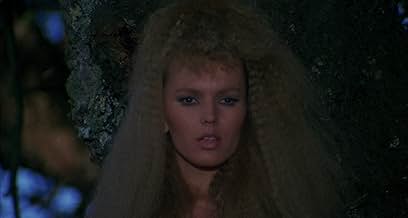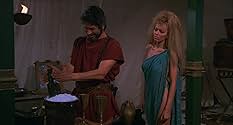Attila flagello di Dio
- 1982
- 1h 31m
IMDb RATING
6.3/10
1.8K
YOUR RATING
The misadventures of Attila and his band of barbarians as they take up arms against the Roman Empire in their native Milano.The misadventures of Attila and his band of barbarians as they take up arms against the Roman Empire in their native Milano.The misadventures of Attila and his band of barbarians as they take up arms against the Roman Empire in their native Milano.
- Directors
- Writers
- Stars
Tony Kendall
- Serpicio
- (as Luciano Stella)
- Directors
- Writers
- All cast & crew
- Production, box office & more at IMDbPro
Featured reviews
Attila flagello di Dio epitomizes the particular strain of Italian comedy that emerged in the early 1980s, characterized by broad physical humor, anachronistic sight gags, and Diego Abatantuono's manic energy unleashed upon unsuspecting audiences. This historical parody, while undeniably entertaining for devotees of demential Italian cinema, suffers from the very excess that defines its cult appeal. The film's premise of transplanting barbarian warfare into contemporary Lombardy provides ample opportunity for comedic mayhem, yet the execution rarely transcends its own silly ambitions to achieve anything approaching satirical depth.
The directing duo demonstrates their usual competence in orchestrating elaborate comic set pieces, though their approach remains frustratingly scattershot. Individual sequences sparkle with inventive visual humor, particularly those involving the clash between ancient warrior customs and modern Italian life, but these moments feel isolated rather than building toward a cohesive comedic vision. The cinematography captures the frenetic action adequately without ever developing a distinctive visual style that might elevate the material beyond its televisual origins. The production design embraces the absurdist premise wholeheartedly, creating a convincingly ramshackle world where barbarian logic collides with bureaucratic reality.
Abatantuono delivers exactly the type of performance his fans expect, channeling his considerable charismatic presence into a role that demands maximum commitment to increasingly ridiculous situations. His portrayal of the delusional Attila balances genuine pathos with outrageous comedy, suggesting depths that the script rarely bothers to explore. Rita Rusic provides capable support as the romantic interest, though her character exists primarily to react to the masculine chaos surrounding her. Angelo Infanti brings professional competence to his supporting role, lending dramatic weight to proceedings that threaten to float away on their own absurdist winds.
The film's greatest weakness lies in its inability to sustain momentum across its running time. While individual scenes generate genuine laughter, the overall structure feels episodic rather than building toward meaningful resolution. The humor relies heavily on repetitive sight gags and cultural stereotypes that, while occasionally inspired, too often substitute volume for wit. The script's attempts to inject social commentary into its historical parody feel perfunctory, lacking the sustained satirical vision necessary to transform cultural observation into meaningful critique.
Despite these limitations, the film succeeds in creating an atmosphere of cheerful anarchy that proves infectious for audiences willing to embrace its deliberately lowbrow sensibilities. The musical score by Franz Di Cioccio and Franco Mussida provides energetic support for the visual comedy while avoiding the intrusive orchestration that mars many contemporary efforts. The supporting cast attacks their roles with appropriate enthusiasm, creating a sense of ensemble commitment that helps sell even the most preposterous comedic conceits.
The directing duo demonstrates their usual competence in orchestrating elaborate comic set pieces, though their approach remains frustratingly scattershot. Individual sequences sparkle with inventive visual humor, particularly those involving the clash between ancient warrior customs and modern Italian life, but these moments feel isolated rather than building toward a cohesive comedic vision. The cinematography captures the frenetic action adequately without ever developing a distinctive visual style that might elevate the material beyond its televisual origins. The production design embraces the absurdist premise wholeheartedly, creating a convincingly ramshackle world where barbarian logic collides with bureaucratic reality.
Abatantuono delivers exactly the type of performance his fans expect, channeling his considerable charismatic presence into a role that demands maximum commitment to increasingly ridiculous situations. His portrayal of the delusional Attila balances genuine pathos with outrageous comedy, suggesting depths that the script rarely bothers to explore. Rita Rusic provides capable support as the romantic interest, though her character exists primarily to react to the masculine chaos surrounding her. Angelo Infanti brings professional competence to his supporting role, lending dramatic weight to proceedings that threaten to float away on their own absurdist winds.
The film's greatest weakness lies in its inability to sustain momentum across its running time. While individual scenes generate genuine laughter, the overall structure feels episodic rather than building toward meaningful resolution. The humor relies heavily on repetitive sight gags and cultural stereotypes that, while occasionally inspired, too often substitute volume for wit. The script's attempts to inject social commentary into its historical parody feel perfunctory, lacking the sustained satirical vision necessary to transform cultural observation into meaningful critique.
Despite these limitations, the film succeeds in creating an atmosphere of cheerful anarchy that proves infectious for audiences willing to embrace its deliberately lowbrow sensibilities. The musical score by Franz Di Cioccio and Franco Mussida provides energetic support for the visual comedy while avoiding the intrusive orchestration that mars many contemporary efforts. The supporting cast attacks their roles with appropriate enthusiasm, creating a sense of ensemble commitment that helps sell even the most preposterous comedic conceits.
This is one of the best examples of trash movies ever made. It's the story of Attila, king of Huns, revisited in a typical Italian-comedy style. Thus, Attila becomes a weird barbarian, speaking with a strong, irresistible southern accent, who, heading a small group of even stranger individuals, try to conquer Rome and to destroy the Roman empire. The film is an uninterrupted sequence of gags, not very refined but really, really effective. A must-see, a masterpiece which unfortunately has only been shot in Italian (I think).
CAMP,TRASH,CULT.closer to a student movie than a film production, this is the "Scary Movie" of the Blair Witch Projects. extremely rare to find in any form,even bootleg,it exists only in original "live feed" italian and was removed when the then producer and now mass media master "got" the girl that stars as attila's wife,who's often naked in the film.
When originally released, this crude spoof of sword-and-sandal epics was not a box office success
so much so that leading man Diego Abatantuono who had scored highly in supporting roles in FANTOZZI CONTRO TUTTI (1980) and the all-star comedy extravaganza, GRAND HOTEL EXCELSIOR (1982) was forced to rethink his persona and re-emerged a few years later as a more versatile actor, culminating in his appearance in the Oscar-winning MEDITERRANEO (1991).
Anyway, there had previously been an earlier straight Italian epic concerned with the exploits of the legendary Barbarian leader Pietro Francisci's ATTILA aka ATTILA THE HUN (1954) starring Anthony Quinn, with which I'm also familiar and which also sported the same original subtitle in some quarters; this remake of sorts has, with the advent of time, constant airplay on Italian TV and the homevideo revolution, become a veritable cult classic on its homeground. This was the main reason why I decided to give it another viewing but, alas, it just isn't very good!
True, Abatantuono is ideally cast as the furry-chested, feather-brained leader of a handful of misfit Barbarians out to destroy the Roman Empire after the latter had destroyed their land, ran off with their women and, worst of all (for them), stolen their precious horses. Despite the presence of other emerging Italian comics Mauro Di Francesco and Francesco Salvi, the not displeasing appearance of a scantily clad Rita Rusic and a folkish score, the brew fails to rise to the surface except intermittently: a Barbarian borrowing the horns of a cow to wear on his head so as not to be inferior to his companion sporting a horned helmet, Abatantuono explaining what each letter of his newly-minted name stands for to a group of Romans guarding a bridge, Abatantuono and Di Francesco forced by a disciplinarian Roman schoolteacher to join a class of Roman kids which they have supposedly just attacked, etc. In spite of these occasional felicities, however, the final verdict remains that as a spoof of the historical epic, ATTILA FLAGELLO DI DIO is a long way even from the two BRANCALEONE films starring Vittorio Gassman which predated it by more than a decade
Anyway, there had previously been an earlier straight Italian epic concerned with the exploits of the legendary Barbarian leader Pietro Francisci's ATTILA aka ATTILA THE HUN (1954) starring Anthony Quinn, with which I'm also familiar and which also sported the same original subtitle in some quarters; this remake of sorts has, with the advent of time, constant airplay on Italian TV and the homevideo revolution, become a veritable cult classic on its homeground. This was the main reason why I decided to give it another viewing but, alas, it just isn't very good!
True, Abatantuono is ideally cast as the furry-chested, feather-brained leader of a handful of misfit Barbarians out to destroy the Roman Empire after the latter had destroyed their land, ran off with their women and, worst of all (for them), stolen their precious horses. Despite the presence of other emerging Italian comics Mauro Di Francesco and Francesco Salvi, the not displeasing appearance of a scantily clad Rita Rusic and a folkish score, the brew fails to rise to the surface except intermittently: a Barbarian borrowing the horns of a cow to wear on his head so as not to be inferior to his companion sporting a horned helmet, Abatantuono explaining what each letter of his newly-minted name stands for to a group of Romans guarding a bridge, Abatantuono and Di Francesco forced by a disciplinarian Roman schoolteacher to join a class of Roman kids which they have supposedly just attacked, etc. In spite of these occasional felicities, however, the final verdict remains that as a spoof of the historical epic, ATTILA FLAGELLO DI DIO is a long way even from the two BRANCALEONE films starring Vittorio Gassman which predated it by more than a decade
A funny farcical comedy that tells the descent of a barbarian warrior from northern Italy to the south to plunder Rome. He will not succeed but on the way he will have a thousand adventures, one more absurd than the previous one.
Did you know
- TriviaThe scene with the Gaul warrior in chains is a nod to a car commercial from 1981, which showed a Renault 18 breaking free from chains in a roman arena. This commercial was directed by Sergio Leone, with music from Ennio Morricone.
- ConnectionsFeatured in Cinemassacre Video: Top 10 Worst Top 10s (2013)
Details
- Runtime1 hour 31 minutes
- Color
- Aspect ratio
- 1.85 : 1
Contribute to this page
Suggest an edit or add missing content



























